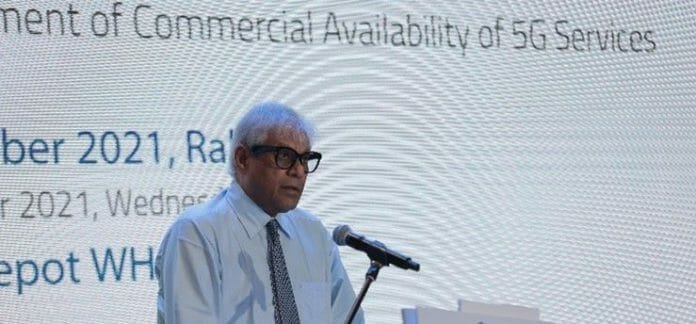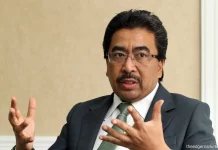Malaysia’s 5G saga is presumably all dusted and settled after the Government reached an agreement between its ministries and Mobile Network Operators who had to abandon their ambition of a Dual Wholesale Network.
While the parties which include the Ministry of Finance, Digital Nasional Berhad, and possibly 7 to 9 MNOs have till June to iron out the details including an equity stake in the spectrum holder, DNB, there are still questions being raised on first the viability of Single Wholesale Network model that has been agreed and why the system which is widely accepted as a failure bring adopted?
Local think tank EMIR Research headed by Dr. Rais Hussain who was formerly Chairman of Malaysia Development and Economic Corporation an agency under the Communication Ministry, firmly maintains the Single Wholesale Network (SWN) is the least preferred model for the new generation network rollout, especially for 5G. Adding that the view is rooted in global empirical data, telecom industry specifics, and economics.
Dr. Rais points to insights from insight spotlight, GSM Association (GSMA) Intelligence which very succinctly summarises the research done by Oxford University and GSMA Intelligence economists, on the outcomes of network sharing deals in Europe, looking at 140 mobile operators in 29 countries.
The data they collected indicates that there has been an increasing trend in passive infrastructure sharing and roaming, over the years, even for previous generation networks in Europe. In contrast, Multi-Operator Core Network (MOCN), the SWN model, constitutes an extremely meager portion of all the announced sharing deals, notably remaining at exactly the same meager level over the 2013-2019 period.
GSMA also underscores that voluntary network sharing (which SWN is not!), such as passive infrastructure sharing and roaming, accelerates deployment, generates significant benefits for operators and consumers, including lower prices and improved network coverage and quality and, therefore, should become an even more significant trend for 5G.
The study of 5G rollout among the top 60 telecoms markets but already worldwide by The Economist Intelligence Unit finds exactly that—passive network sharing is the strong trend for 5G. In comparison, SWN is a clear anti-trend for the 5G rollout as none of those 60 countries adopted the SWN model for their 5G rollout.
Also, in its spotlight, GSMA specifically warns that deploying SWN for 5G would be even more inimical for the industry than for the previous generation networks as it will negatively impact not only the telecom industry itself but industry 4.0. This is because SWN is synonymous with delinking of network ownership from service delivery and thus unavoidably leads to limited network (equipment) innovation, which will negatively impact the rollout of innovative services by the end-users of the network.
And already very specifically, DT Economics LLP, a specialist consulting firm based in London focusing on regulation, competition, and expert witness services, being commissioned by GSMA, has produced an independent economic expert report to qualitatively assess the Malaysian proposals for 5G network deployment, list very real risks to Malaysia putting its vision to become a regional leader in the digital economy under serious threat should the country proceed with the DNB proposal. Note that the most serious risks of creating this upstream monopoly remain regardless of the SWN ownership structure.
He notes that looking at all this overwhelming global evidence against the SWN case, probably can answer whether we would be able to see effective implementation of the 5G network in Malaysia under the approved SWN rollout model even if MNOs hold a 70 percent stake in it.
The exMDEC Chairman adds, the new ownership structure of 70 percent owned by the MNOs raises new concerns and questions as no details were provided vis-à-vis the type of shares offered to MNOs versus DNB. Saying it is important to understand the extent to which MNOs would have their say in management.
Dr Rais also argues if the MNOs had their say, they would scrap DNB’s “supply-led” “cost recovery” rollout, and Malaysia would see at least a more reasonable, demand-driven approach to the 5G rollout. Even though it would still be an upstream monopoly with all the ensuing negative consequences to the Malaysian digital economy as highlighted above.
Questions are also raised on how a 70 percent equity stake will be carved out? How the Board of Directors structure will be with new shareholders? What will be their voting rights? Will, what is “deemed national interests” (usually translated as politician masters interests), overwhelm commercial viability? Will the 70 per cent owners have a say in costs in DNB?
The public would be very interested to see DNB opening up their books to figure out DNB’s real value. And do not forget that one other fundamental question that DNB has not addressed to date is how many square kilometres are the so-called “population areas”? How many towers will be required? Budgeted amount does it sufficiently cover the required? Then you can count the billions.
Lastly Dr Rais questions if indeed MNOs actually take up the 70 percent equity, given amongst them, they have all the skills, knowledge, and abilities to deliver, and they can tap into their existing resources, why then the need for DNB? What is DNBs value contribution? If it is to ensure delivery of 5G, why don’t make it a mandatory license condition to MNOs? If it is to ensure 5G coverage in rural areas (though 4G is more than enough given the type of utilisation), then access the Malaysian Communications and Multimedia Commission’s Universal Service Provision (USP) funds to extend the access coverage to rural areas.
If DNB exists as a project manager and “contract administrator” of the 5G rollout project, they surely must be one of the most “expensive” project manager cum contract administrator ever in Malaysian history.
Dr Rais Hussin is the CEO of EMIR Research, an independent think tank focused on strategic policy recommendations based on rigorous research.









